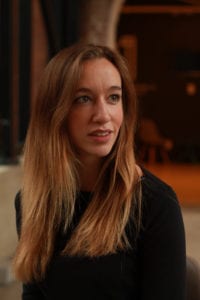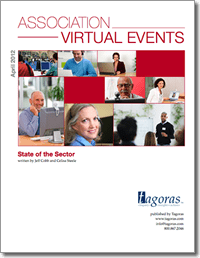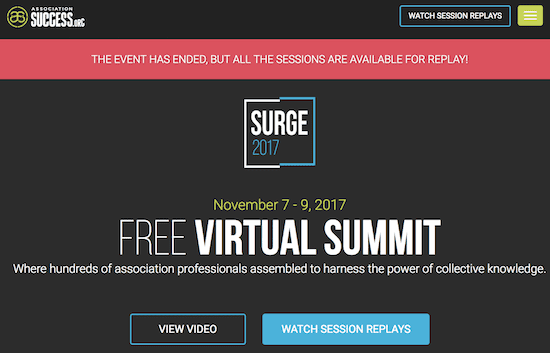Virtual events should be an important topic for all learning businesses seeking to expand their reach and connect with learners. But many organizations haven’t added virtual events to their list of educational offerings simply because they aren’t quite sure how to go about planning and implementing them.
Arianna Rehak, who runs AssociationSuccess.org, an organization aimed at helping associations thrive and succeed in today’s ever-changing environment, is the impresario behind the recent virtual summit, Surge 2017—something we had the pleasure of experiencing both as presenters and as participants. With her first successful event under her belt, Arianna has valuable insights for anyone who may be interested in hosting – or improving – a virtual event.
In this episode of the Leading Learning podcast, Jeff talks with Arianna about what went into planning Surge, how she got people to authentcially engage and promote it, as well as some of the biggest challenges and lessons learned from the event.
To tune in, just click below. To make sure you catch all of the future episodes, be sure to subscribe by RSS or on iTunes. And, if you like the podcast, be sure to give it a tweet!
Listen to the Show
Read the Show Notes
[00:18] – Jeff and Celisa acknowledge the Founding Sponsors for a new initiative they have under way. Specifically, they are very close to helping the folks at 100Reviews – Ben Martin and Teri Carden – launch a new learning management system review site that is built on the same model as their very successful ReviewMyAMS site. They are helping to create a very transparent space in which an LMS user can review the systems they are using so that other organizations who are looking for an LMS have access to that information as part of their decision process. The four companies that have stepped up to help get this off the ground are:
If you are looking for an LMS, we really encourage you to visit these companies and see what they have to offer.
[02:03] – Highlighted Resource of the Week – Association Virtual Events – a free Tagoras report that draws on data from more than 100 associations to help you understand the emerging role of virtual events in the association sector.
[02:33] – A preview of what will be covered in this podcast where Jeff talks with Arianna Rehak of AssociationSuccess.org about the recent virtual event she organized, Surge 2017.
[04:09] – Introduction to Arianna and some information about what she does at AssociationSuccess.org and what they aim to do as an organization.
[06:23] – Arianna talks about how she got involved working in the association space and at AssociationSuccess.org.
[07:33] – For those not familiar with Surge 2017, can you say a little bit about the event? Although she always referred to Surge as a “virtual summit” Arianna says she’s come to understand that it’s not really the right term for it. She explains how the event came to be, including that the idea was initially rejected. After bringing together a team of ten people to discuss it, eventually the event was configured to include 12 sessions being played in a three-day period with an attendee chat, and a speaker Q&A—because the sessions themselves were pre-recorded.
[10:21] – Had you ever organized anything like this personally before? What was your experience before this? Arianna admits she had no prior experience with something like this but that running AssociationSuccess.org is almost like a giant qualitative research study because she ends up talking to so many association professionals. It was really important that this was a community-driven event and she continually came back to an advisory and volunteer team. Surge was truly a collection of many people’s insights and the event never could have happened without the strong support, encouragement, and resources she was given along the way.
[12:24] "]– From my experience, both before and during the event, people seemed to be very engaged in Surge. Even though the sessions were pre-recorded, there was a lot going on in the chat rooms/Q&A and people seemed to be pretty pumped up about it – how did you make all of that happen? Arianna attributes it to the fact that it was community driven. She talks about Dan Ariely, a behavioral economist, and explains the Ikea Effect which basically demonstrates that if you’re directly involved in creating or building something, you see the value behind it. So the more people are involved in producing something, the more genuinely they are going to want to promote it. It’s also a more robust idea the more people are involved in it.
[15:07] – What were some of the challenges you encountered in trying to put this event together? Arianna shares one of the big challenges was having so many ideas she wanted to see happen and she had to be realistic about what could be done. One of the ideas she really wanted to implement but wasn’t able to was to find some sort of way to connect the physical and the virtual space. There are so many local groups of association professionals and she wanted to try and work with these groups and have “event pods”. This is where people watch the sessions together and then discuss the content. She had started trying to implement this into the event but in the end it was just too much.
[17:16] – Jeff shares how with the Tagoras virtual event, Learning • Technology • Design™ (LTD), they recognize there are multiple people in an organization attending the event. Because of this, they’re going to make sure to provide more tools to help those people interact with the event content more as a group in the room together. He also talks about how last year, they got participants to take selfies and post them to Twitter to get a feel of seeing the people as well as them being in the chat room.
[18:25] – Arianna adds one of the other elements of Surge is the idea of collective knowledge. One of the things they are doing this round is, for each session, they are putting together an eBook that has a collection of takeaways from the sessions and the chat. Very often people don’t go into significant detail in the chat so they are actually reaching out to people to get longer anecdotes. For Surge 2018 Arianna says one of the things they are thinking of doing with the event pods is giving each group a very specific problem to solve—so rather than just talking about discussion questions, now they will be talking to each other to co-create something and be solutions-focused.
[20:16] – What did the process of working with the presenters involve? What made you confident you had identified people who could deliver the experience you were looking for? Arianna says it really depended on session and they all kind of had their own origin story. One of the big benefits of the way they did the sessions was they were pre-recorded through Zoom. So if you were really shy and not a public speaker, for example, it significantly lowered the boundary for entry—you’re looking at the other speakers while you’re talking and it’s a discussion, which requires far less prep time. The topics were chosen based on pain points in the association space and she then identified people to be part of that session who came at it from different angles/perspectives—she uses an example of the topic of non-dues revenue to illustrate this.
[23:40] – How challenging was it to get the presenters to pull everything together (deliver on time, understand the technology, etc.)? Arianna reflects that one mistake she made was she didn’t push the deadlines enough but so many of the sessions came in really last minute. She also talks about how they dealt with one session in particular that almost didn’t happen. Another mistake she made was telling people they could edit the session after the fact and to speak for as long as comes naturally—this made for a lot of extra work trying to edit sessions down to 55 minutes.
[27:17] – You got more than a thousand people there—how did you market it and what really worked in terms of attracting people to it? Arianna shares a story to highlight this working (that goes along with the Ikea Effect). One thing that was really important to her was for the speakers to very much feel a part of it—she sent a lot of personal videos and tried to give updates as much as possible. In fact, she acknowledges that when the event was mentioned in the Tagoras newsletter, that ended up accounting for 10% of their total registration, in one day. From a data perspective, she wishes she could answer this question a little better but where she saw the spikes in registration was when it came from a sort of genuine stamp of approval. They partnered with a company called Snöball which creates personalized landing pages for everyone—registrants and speakers got this—so it was a good way to share the event using social proof of sorts. This also caused a big spike in registrations, which put them over the edge. For anyone doing virtual events, Arianna points out that a lot of registrations come in last minute.
[31:10] – As you’re planning for the next event, what are some things you definitely will do based on what you’ve learned this time and what are some things you definitely will not do as you’re planning for the next event? One thing Arianna says she won’t do is an official call for submissions, likely on the individual level because the sessions where they paired people up that had knowledge on a certain topic but came at it from a different angle, helped to create an interesting opportunity for co-creation and also to meet other people. One thing they are definitely going to be doing is getting a lot of feedback on what topics are of interest to people. They are going to keep it at 12 sessions but she wants to make sure those sessions are a proper reflection on what people want to learn and hear about. She is also definitely going to pursue the “event pods” for having some local gatherings because one thing she really felt at the end of the event that was lost value was that people seemed to want to continue the conversation and she didn’t have a place for them to do that. She really likes the idea of having people come together in the local space to continue the discussion.
[33:24] – How do you go about your own lifelong learning? Arianna’s big eureka moment was understanding the value of applied learning and that what she learned in school was always very different than what was happening in her life. When Arianna started working at the marketing firm, in particular, she discovered if she gained some skills in certain areas, she’d be more effective at her job. For example, she talks about how she took an HTML course online to get insight into how developers think (after noting they seemed frustrated with how she was communicating with them). This empowered her and made her realize that everything she learns about is something added to the toolkit to help her solve problems, which in turn makes other problems easier to solve—and this makes learning very addictive.
[36:05] – A question we like to ask all of our guests is what is one of the most powerful learning experiences you’ve been involved in since finishing your formal education—it sounds like this was one of them—is that right? Arianna says it was and also Surge, in general, was like the capstone project of everything she knew in life.
[36:30] – Is it still possible for people to access the 2017 Surge sessions? Yes, click here to watch session replays. Arianna also highly recommends checking out Jeff’s session, Facing – and Embracing – the Future of Learning which he co-presented with Amanda Beckner (Vice President of Learning, AVIXA), Josh Goldman (Vice President of Learning, Ohio Society of CPAs), and Celisa Steele (Co-Founder & Managing Director, Tagoras).
[37:19] – How to connect with Arianna:
- Email: arianna.rehak @ associationsuccess.org – feel free to email her with ideas for sessions or recommendations for thought leaders.
Arianna adds she’s in the planning phases of putting together an online course on how to run a virtual summit (although “virtual summit” is not the right name for it).
[39:00] – Wrap Up
If you are getting value from the Leading Learning podcast, be sure to subscribe by RSS or on iTunes. We’d also appreciate if you give us a rating on iTunes by going to https://www.leadinglearning.com/itunes.
Also, consider telling others about the podcast. Go to https://www.leadinglearning.com/share to share information about the podcast via Twitter, or send out a message on another channel of your choosing with a link to https://www.leadinglearning.com/podcast.
[40:30] – Sign off
See also:




 Lessons Learned from a Career in Learning with Diane Simmons and Carol Hodes
Lessons Learned from a Career in Learning with Diane Simmons and Carol Hodes
Leave a Reply